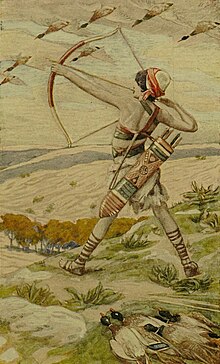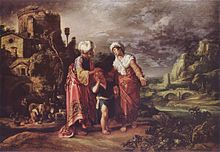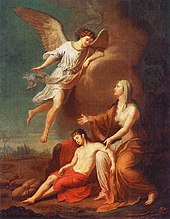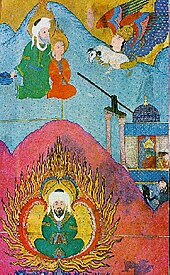
Abraham is the common Hebrew patriarch of the Abrahamic religions, including Judaism, Christianity, and Islam. In Judaism, he is the founding father of the special relationship between the Jews and God; in Christianity, he is the spiritual progenitor of all believers, whether Jewish or non-Jewish; and in Islam, he is a link in the chain of Islamic prophets that begins with Adam and culminates in Muhammad. As the namesake of the Abrahamic religions, Abraham is also revered in other Abrahamic religions, such as Druze Faith and Baháʼí Faith.
The Book of Genesis is the first book of the Hebrew Bible and the Christian Old Testament. Its Hebrew name is the same as its first word, Bereshit. Genesis purports to be an account of the creation of the world, the early history of humanity, and the origins of the Jewish people.

Isaac is one of the three patriarchs of the Israelites and an important figure in the Abrahamic religions, including Judaism, Christianity, and Islam. Isaac first appears in the Torah, in which he is the son of Abraham and Sarah, the father of Jacob and Esau, and the grandfather of the twelve tribes of Israel.

Abraham was a prophet and messenger of God according to Islam, and an ancestor to the Ishmaelite Arabs and Israelites. Abraham plays a prominent role as an example of faith in Judaism, Christianity, and Islam. According to the Islamic perspective, Abraham fulfilled all the commandments and trials wherein God nurtured him throughout his lifetime. As a result of his unwavering faith in God, Abraham was promised by God to be a leader to all the nations of the world. The Qur'an extols Abraham as a model and exemplar: obedient and not an idolater. In this sense, Abraham has been described as representing "primordial man in universal surrender to the Divine Reality before its fragmentation into religions separated from each other by differences in form". Muslims believe that the Ka'aba in Mecca was built by Abraham and his son Isma'il as the first house of worship on Earth. The Islamic holy day, Eid al-Adha, is celebrated partly in commemoration of Abraham's willingness to sacrifice his son on God's command.

Sarah is a biblical matriarch, prophet, and major figure in Abrahamic religions. While different Abrahamic faiths portray her differently, Judaism, Christianity, and Islam all depict her character similarly, as that of a pious woman, renowned for her hospitality and beauty, the wife and half-sister of Abraham, and the mother of Isaac. Sarah has her feast day on 1 September in the Catholic Church, 19 August in the Coptic Orthodox Church, 20 January in the LCMS, and 12 and 20 December in the Eastern Orthodox Church.
The biblical patriarch Isaac, Isak is recognized as a prophet of God by Muslims. As in Judaism and Christianity, Islam maintains that Isaac was the son of the patriarch and prophet Abraham from his wife Sarah. Muslims hold Isaac in deep veneration because they believe that both Isaac and his older half-brother Ishmael continued their father's spiritual legacy through their subsequent preaching of the message of Allah after the death of Abraham. Isaac is mentioned in fifteen passages of the Quran. Along with being mentioned several times in the Quran, Isaac is held up as one of Islam's prophets.

According to the Book of Genesis, Hagar was an Egyptian slave, a handmaiden of Sarah, whom Sarah gave to her own husband Abram as a wife to bear him a child. Abraham's firstborn son, through Hagar, Ishmael, became the progenitor of the Ishmaelites, generally taken to be the Arabs. Various commentators have connected her to the Hagrites, perhaps claiming her as their eponymous ancestor. Hagar is alluded to, although not named, in the Quran, and Islam considers her Abraham's second wife.

Bakkah, is a place mentioned in surah 3, ayah 96 of the Qur'an, a verse sometimes translated as: "Indeed, the first House [of worship] established for mankind was that at Bakkah [i.e., Makkah] - blessed and a guidance for the worlds."
Yaqub ibn Ishaq ibn Ibrahim ibn Azar, later given the name Israil, is recognized by Muslims as an Islamic prophet. He is held to have preached the same monotheism as his forefathers: Abraham, Ishmael, and Isaac.
Nebaioth or Nebajoth is mentioned at least five times in the Hebrew Bible, according to which he was the firstborn son of Ishmael, and the name appears as the name of one of the wilderness tribes mentioned in the Book of Genesis 25:13, and in the Book of Isaiah 60:7.

The Ishmaelites were a collection of various Arab tribes, tribal confederations and small kingdoms described in Abrahamic tradition as being descended from and named after Ishmael, a prophet according to the Quran, the first son of Abraham and the Egyptian Hagar.

Lech-Lecha, Lekh-Lekha, or Lech-L'cha is the third weekly Torah portion in the annual Jewish cycle of Torah reading. It constitutes Genesis 12:1–17:27. The parashah tells the stories of God's calling of Abram, Abram's passing off his wife Sarai as his sister, Abram's dividing the land with his nephew Lot, the war between the four kings and the five, the covenant between the pieces, Sarai's tensions with her maid Hagar and Hagar's son Ishmael, and the covenant of circumcision.
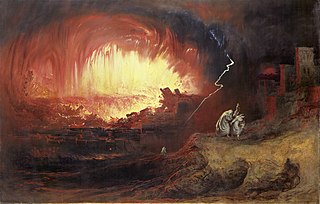
Vayeira, Vayera, or Va-yera is the fourth weekly Torah portion in the annual Jewish cycle of Torah reading. It constitutes Genesis 18:1–22:24. The parashah tells the stories of Abraham's three visitors, Abraham's bargaining with God over Sodom and Gomorrah, Lot's two visitors, Lot's bargaining with the Sodomites, Lot's flight, the destruction of Sodom and Gomorrah, how Lot's daughters became pregnant by their father, how Abraham once again passed off his wife Sarah as his sister, the birth of Isaac, the expulsion of Hagar, disputes over wells, and the binding of Isaac.

Chayei Sarah, Chaye Sarah, Ḥayye Sarah, or Ḥayyei Sara, is the fifth weekly Torah portion in the annual Jewish cycle of Torah reading. It constitutes Genesis 23:1–25:18. The parashah tells the stories of Abraham's negotiations to purchase a burial place for his wife Sarah and his servant's mission to find a wife for Abraham's son Isaac.
Hājar, known as Hagar in the Hebrew Bible, was the wife of the patriarch and Islamic prophet Ibrahim (Abraham) and the mother of Ismā'īl (Ishmael). She is a revered woman in the Islamic faith. According to Muslim belief, she was a maid of the king of Egypt who gifted her to Ibrahim's wife Sarah. Although not mentioned by name in the Qur'an, she is referenced and alluded to via the story of her husband. She eventually settled in the Desert of Paran, seen as the Hejaz in the Islamic view, with her son Ishmael. Hajar is honoured as an especially important matriarch of monotheism, as Ishmael was the ancestor of Muhammad.
The Quran contains references to more than fifty people and events also found in the Bible. While the stories told in each book are generally comparable, there are also some notable differences.
Abraham is known as the patriarch of the Israelite people through Isaac, the son born to him and Sarah in their old age and the patriarch of Arabs through his son Ishmael, born to Abraham and Hagar, Sarah's Egyptian servant.
There are many Biblical figures which the Qur'an names. Some, however, go unnamed in the Qur'an, but are referenced or referred to in the hadiths, tafsirs, literature or seerah. Other figures are mentioned elsewhere in tradition and in the sunnah and sayings of Muhammad. Such figures which are not mentioned by name in the Qur'an, are included below.
Ishmael is regarded by Muslims as an Islamic prophet. Born to Abraham and Hagar, he is the namesake of the Ishmaelites, who were descended from him. In Islam, he is associated with Mecca and the construction of the Kaaba within today's Masjid al-Haram, which is the holiest Islamic site. Muslims also consider him to be a direct ancestor to Muhammad. His paternal half-brother was Isaac, the forefather of the Israelites.

Rebecca appears in the Hebrew Bible as the wife of Isaac and the mother of Jacob and Esau. According to biblical tradition, Rebecca's father was Bethuel the Aramean from Paddan Aram, also called Aram-Naharaim. Rebecca's brother was Laban the Aramean, and she was the granddaughter of Milcah and Nahor, the brother of Abraham. Rebecca and Isaac were one of the four couples that some believe are buried in the Cave of the Patriarchs, the other three being Adam and Eve, Abraham and Sarah, and Jacob and Leah. Most scholars have considered Rebecca's historicity uncertain.
